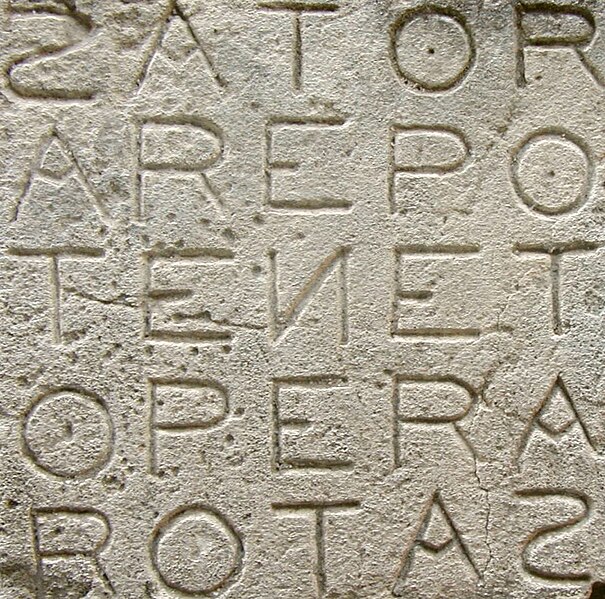I suppose it is a mark of just how much of a nerd I am, that I am terribly excited to discover, via the Google Doodle, that today marks the 100th anniversary of the creation of the crossword puzzle. Yes, I actually do crossword puzzles regularly. I have a huge book of New York Times puzzles that I've been working on for a couple years. I have several smaller books of wordplay games, which I carry about. I am terribly fond of Bananagrams. At present, Google has a crossword puzzle up for you to play with it you want to. And I, to celebrate, shall bestow upon you all, the following bits of trivia about crosswords.
1.) The first crossword puzzle was published in the Sunday New York World - and was created by a Liverpudlian named Arthur Wynne.
2.) Crossword puzzles are based of an older children's game of word square, in which words were entered into a grid, so that the words can be read both horizontally and vertically. For example:
Word squares is, in turn, believed to have come from a Latin tradition, based on carved examples of what is knows as the Sator Square:

3.) A crossword puzzle published in the Daily Telegraph was used as a recruiting device by the British Secret Service during WWII. I can't remember which book I read, about Bletchley Park and the breaking of the Nazi's Enigma Code, which had a reprint of the puzzle in it. Potential recruits had to finish it in 12 minutes, and I was only halfway through by that time. However, I shall point out that British crosswords are considerably different from the American puzzles I am used to - there is a lot of punning wordplay involved. Here is one of the clues for an example:
4ac - The direct route preferred by the Roundheads.
The answer is a short cut. Because, you see, the Roundheads were given that nickname on account of their hair, which was cut very short by the standards of the time, and a short cut is usually the most direct route. So there you are.
4.) Crosswords became part of WWII history again during the top secret Allied preparations for the D-Day invasions. A number of code words for the operation showed up as answers to the puzzle, causing fears of leaked information. It turned out to be mostly a co-incidence, however. The puzzle's creator had overheard soldiers using some of the words, but since they sounded so harmless - mulberry surely could not mean anything could it? - he had no idea that it was code.
5.) Although crosswords became a regular feature of most papers during the 1910's, the word crossword did not enter the dictionaries until 1930
Finally, here is a copy of the original crossword puzzle, in case anyone wants to get in on the fun, as solve it.


1 comment:
You're like a walking encyclopedia of weirdness.
XD Actually no, you're very cool to know so much random stuff. It's just really fun to quote that line.
Crosswords are cool.
And I shall have you know that I came THIS close to writing Crossroads instead of crosswords. Too much SPN.
Post a Comment